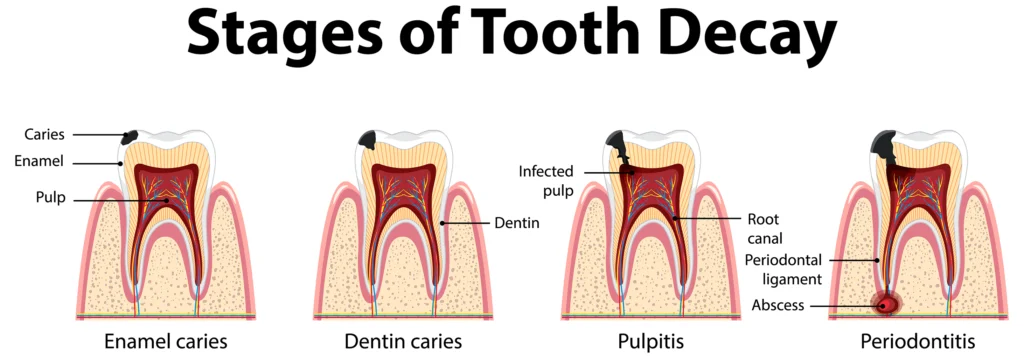At some point, you may have heard the term “root canal” and associated it with dental procedures that many find intimidating. However, root canals are a beneficial and often necessary treatment for saving teeth that have been severely damaged or infected. At Big Sky Family Dental, we understand that patients have concerns and questions about this procedure. This article will help you understand what a root canal is, why it might be necessary, and what you can expect in terms of cost and benefits.
What Is a Root Canal?
A root canal is a dental procedure designed to remove infection from the inside of a tooth and preserve its natural structure. The procedure involves cleaning the tooth’s root canals (hence the name), which are the spaces within the roots of your teeth that house the pulp. The pulp consists of nerves, blood vessels, and connective tissue, essential to a tooth’s development. However, once the tooth is fully developed, it can function without the pulp, relying instead on surrounding tissues for nourishment.
A root canal is necessary when the pulp becomes inflamed or infected due to deep decay, cracks, or trauma to the tooth. If left untreated, this infection can spread, leading to severe pain, abscesses, and even tooth loss.

The Root Canal Procedure: Step by Step
Here is an outline of what happens during a root canal at Big Sky Family Dental:
- Examination and X-rays: First, will examine your tooth and take X-rays to assess the extent of the damage or infection.
- Anesthesia: Before the procedure begins, local anesthesia is applied to numb the tooth and surrounding area. This ensures that you will not feel pain during the treatment.
- Accessing the Pulp Chamber: A small hole is drilled in the top of the affected tooth to access the pulp chamber and root canals.
- Removing the Infected Pulp: Using specialized instruments, the dentist will carefully remove the infected or damaged pulp from the root canals.
- Cleaning and Shaping: Once the pulp is removed, the canals are thoroughly cleaned and shaped to prepare them for filling.
- Filling the Canals: After cleaning, the canals are filled with a biocompatible material called gutta-percha to seal them and prevent future infections.
- Sealing the Tooth: In most cases, a temporary filling will be placed over the hole in the tooth to protect it until a permanent crown can be placed.
- Restoration: In a follow-up visit, a permanent crown or filling will be placed on the tooth to restore its shape, strength, and function.
Why Do I Need a Root Canal?
A root canal is often necessary when the pulp of a tooth becomes infected or severely damaged. Several conditions may lead to the need for this treatment:
- Deep Tooth Decay: If a cavity is left untreated, bacteria can penetrate deep into the tooth, reaching the pulp and causing infection. A root canal removes the infected pulp and saves the tooth from extraction.
- Cracked or Chipped Tooth: A crack or chip in a tooth can expose the pulp, allowing bacteria to enter and cause infection. This treatment can help repair these issues and preserve the tooth.
- Trauma to the Tooth: Even if a tooth doesn’t crack, a traumatic injury may damage the pulp. In such cases, a root canal can prevent further deterioration and avoid tooth loss.
- Abscess or Infection: If an infection spreads beyond the pulp and into the root, it can cause a painful abscess, which is a pocket of pus. A root canal is necessary to remove the infection and promote healing.
- Tooth Sensitivity or Pain: If you are experiencing severe tooth pain, especially when biting or eating hot or cold foods, it could be a sign of infection or damage inside the tooth. A root canal can alleviate the pain and restore normal function.
Are Root Canals Painful?
One of the most common questions patients ask at Big Sky Family Dental is, are root canals painful? The answer is reassuring: root canals are not as painful as their reputation might suggest. The procedure is designed to relieve pain rather than cause it.
With advances in modern dentistry and the use of local anesthesia, they are generally no more uncomfortable than getting a filling. Most patients report feeling only mild discomfort or pressure during the procedure. After the treatment, some tenderness may persist for a few days, but over-the-counter pain relievers are typically enough to manage it.
It’s important to remember that the pain associated with a damaged or infected tooth will only worsen without treatment. A root canal eliminates the source of pain, helping you feel better in the long run.
The Benefits of a Root Canal
While the idea of undergoing a root canal may seem daunting, the benefits far outweigh any temporary discomfort. Here are some key advantages of root canal treatment:
1. Preserves Your Natural Tooth
One of the most significant benefits of a root canal is that it allows you to keep your natural tooth. Tooth extraction may seem like an easier solution, but it can lead to additional complications such as shifting teeth, difficulty chewing, and the need for costly tooth replacements like bridges or implants. A root canal helps you avoid these issues by saving your tooth.
2. Relieves Pain and Discomfort
A tooth infection can cause severe pain, swelling, and sensitivity. A root canal removes the source of the infection, providing much-needed relief and improving your quality of life.
3. Prevents the Spread of Infection
If left untreated, an infection inside the tooth can spread to other teeth, gums, or even the jawbone, leading to more severe health issues. A root canal stops the infection from progressing and helps you avoid more invasive treatments in the future.
4. Enhances Oral Health
A tooth saved by a root canal can continue to function normally, allowing you to eat, speak, and smile with confidence. By preserving your natural tooth, root canals contribute to long-term oral health and stability.
General Cost of a Root Canal
The cost of a root canal varies depending on several factors, including the location of the tooth (front teeth are generally less expensive than molars) and the complexity of the procedure. On average, the cost of a root canal ranges from $700 to $1,500 per tooth. Molars, which are more difficult to treat, tend to be on the higher end of this range.
Keep in mind that the total cost may include additional fees for X-rays, anesthesia, and the placement of a crown after the procedure. A crown is often necessary to restore the tooth’s strength and protect it from further damage.
At Big Sky Family Dental, we understand dental procedures can be a financial concern for many patients. That’s why we offer flexible payment options and work with a variety of insurance providers to make the process as smooth and affordable as possible. We encourage you to speak with our team for a detailed cost estimate based on your specific needs.
Conclusion
A root canal is a highly effective and often necessary treatment for saving a damaged or infected tooth. Despite common misconceptions, the procedure is relatively painless and provides long-term benefits for your oral health. Whether you’re suffering from tooth pain, an abscess, or deep decay, Big Sky Family Dental is here to provide expert care and ensure that your dental health is restored.
Our team is dedicated to making the process as comfortable as possible. Contact Big Sky Family Dental today to learn more about root canals and how they can help save your smile.


